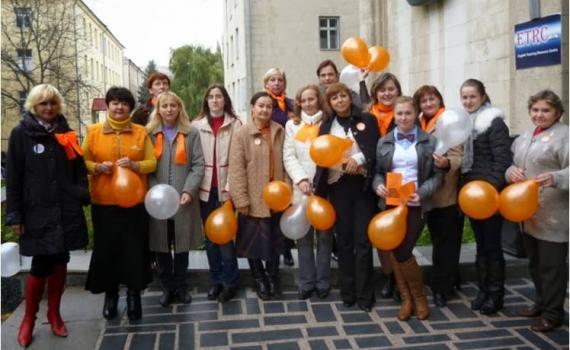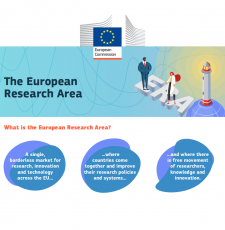
Open access is a new systemic approach in institutional and national policies and strategies in Moldova, writes Natalia Cheradi, Deputy Director, The Scientific Library, Academy of Economic Studies of Moldova (ASEM) and EIFL Open Access Country Coordinator.
In the Republic of Moldova, the government and the academic community have made considerable efforts to promote open access to research. Open access is now a new systemic approach in institutional and national policies and strategies. The scientific community, publishers, funders and librarians have come to realize over the past 15 years that the promotion and implementation of open access policies at the national level are necessary, because the model radically changes the way of doing research, and the lack of its implementation in The Republic of Moldova will make local science non-competitive.
What has changed in open access and open science in Moldova?
In the last few years, the Republic of Moldova has made significant progress in promoting open access to research and academic information. Key elements of change include:
- Policies and regulatory documents that encourage publication in open access and open access to research. In 2022, the new law on copyright and related rights was adopted. The law provides provisions on open access to scientific publications.
- Awareness and education – researchers and academic institutions are increasingly aware of the benefits of open access and encourage the publication of papers in open access journals and depositing in open access repositories. There are also initiatives to educate and promote open access among students and teachers. Moldova’s scientific and educational community demonstrates unity and a high degree of support for open access journals and institutional repositories.
- Increase in the number of open access journals – in recent years, the number of open access journals has increased significantly (124 journals by May 2023), providing more opportunities for researchers to publish in open access.
- Institutional support – academic institutions and research organizations provide support and resources for researchers who wish to publish their work in open access journals or make it available in open access repositories. There are 15 institutional repositories, using DSpace free and open source software, and their content is growing, providing open access to scientific, educational and cultural materials. Universities also publish open access journals.
- International cooperation – the Republic of Moldova has collaboration agreements with international organizations and other countries to promote open access to research and to share good practices and experiences in the field.
Open access to scientific information helps citizens to exercise their right to access to knowledge produced through public funding. This right is not only to the advantage of citizens, but is also useful to funding institutions. Public examination of research results improves the way the funds for research are allocated and the quality of research.
The processes and dynamics leading to change
The open access movement was launched by university libraries and the Association of Librarians through activities led by EIFL’s partner library consortium, REM (Electronic Resources for Moldova). From 2008 to 2011 several organizations and universities began to promote open access and to develop infrastructure for publishing and opening access to research. Since then, the number of organizations promoting open access and the number of open access journals has increased significantly.
The EIFL Open Access Moldova programme (EIFL-OA Moldova), established within REM in 2008, assists members of the consortium to develop open access initiatives, promote open access and establish open access infrastructures - institutional repositories and journal publishing platforms.
EIFL-OA Moldova also helps universities and other research institutions to design strategies and policies, building on the Moldova Library Association Statement on Open Access to Information that was adopted on 16 October 2009, and which was for a long time the only document at the national level supporting open access to scientific information.
Since then, several strategic documents, policies and normative acts regarding access to information have been adopted and implemented, requiring educational and research institutions to provide free access to information of public interest.
On 22 November 2018, the government approved the Declaration on Open Science in the Republic of Moldova.The Declaration contributes to improving understanding of the benefits of open science and aims to encourage the development of comprehensive public policies that address the challenges of openness throughout the entire cycle of scientific research.
To inform the library community, REM created a blog - EIFL-OA Moldova.
REM also encourages members of the university and academic community, local government officials, students and the general public to participate in activities during International Open Access Week, which has been held annually in the Republic of Moldova since 2010. Open Access Week has been a good platform for promoting open access countrywide and to disseminate as widely as possible the results of scientific activity financed by public funds and projects based on the principles of open access.
Academic and public libraries have engaged in various actions to promote open access, hosted public Information Days, posted information on websites, YouTube and Facebook. These actions attracted the attention of the university senates and administrations to develop open access policies and informed broader audiences about the nature and importance of open access.
At first, the academic community were sceptical about open access, and the number of publications in open access journals and institutional repositories grew very slowly. As a result of promotion by university departments and librarians, the level of awareness about the open access movement and the willingness of authors to make their works open access has increased. This willingness is a strong argument in favour of further developing the network of open access repositories and expanding the number of journals registered on open platforms.
In recent years, several projects have been launched to support open access and modernize research support services to improve the quality of university studies, which also emphasize open and free access to scientific information. The analysis of legislative and strategic documents allows us to conclude that the Moldovan society has become aware of the need to create tools for the valorization and promotion of research results, and the policy documents are aligned with the European documents.
Institutional policies recognize the strategic importance of open access for disseminating scientific knowledge in a spirit promoted by international initiatives and declarations - to benefit from international content, to ensure the creation and distribution of local content and to increase research visibility and impact. Open access has improved dissemination of the findings of research carried out within the Republic of Moldova. All universities now make content available in open access repositories.
REM and universities have worked together to provide support and resources for researchers who wish to publish their work in open access journals. Training sessions and workshops for researchers have been organized and online platforms for research publication and access have been developed. Universities created their own open access journals and encouraged researchers to publish in them.
REM, consisting of 15 institutions, recognizes the strategic importance of open access and commits to it in policies and strategies. The basic strategy can be summarized as follows:
- Implementing open access to scientific publications through two complementary models: Self-archiving in institutional repositories and registering open access journals in international indexes, e.g. DOAJ - Directory of Open Access Journals.
- The policies require that all scientific publications developed under the research projects financed from the state budget or grants are included in institutional repositories on the date of publication. Permission granted by the authors is a non-exclusive, irrevocable licence that exercises all the rights under copyright; it allows open access distribution of materials published on condition that they will not be used to gain profit.
- The authors are encouraged to include other types of didactic publications other than articles (e.g. monographs etc.) in institutional repositories.
- Adopting an efficient peer review process to ensure the quality of scientific publications.
- Institutional policies on open access have been entered in the form of institutional mandates into ROARMAP (Registry of Open Access Repositories Mandatory Archiving Policies) that authorizes open access to the findings of scientific research carried out with public funds. At the moment, 12 policies from the Republic of Moldova are registered in ROARMAP.
- All relevant parties – departments supporting scientific research, researchers, librarians and other actors - promote a quick and efficient transition to open access publishing.
Currently it is necessary to study the legal framework of the institutions to adequately initiate the procedures for implementing open access to scientific information and to cooperate with the departments responsible for scientific activities in order to establish the legal requirements that should be met.
The reality in which we exist imposes increased responsiveness to changes that occur in all spheres of life, particularly in the field of information and communication. Under these circumstances, the role of the library in promoting scientific knowledge through various ways and methods increases enormously. Open access is one of the most progressive movements in the world information community. The access and sharing of information are essential for the successful development of society and librarians play a crucial role as leaders pleading for the promotion of open access to digital scientific information.
EIFL’s role in driving change
EIFL has collaborated with the Association of Librarians of the Republic of Moldova and REM, and with universities and other organizations to promote open access and provide support, resources and training for the development of repository and open access publishing infrastructure and new library services, in addition to providing assistance with open access policies and strategies.
REM created a discussion and support platform for open access, and EIFL provided technical and financial support for the development and implementation of this platform. EIFL financed two projects for the Republic of Moldova: ‘Advocacy for Fair Copyright Laws in Moldova: Role of Libraries’ (2009) and ‘Open Access – an important element of optimizing scientific and academic communication’ (2012).
Right from the first project about open access in Republic of Moldova – ‘Open Access to content in Moldovan Higher Economic Education, implemented by REM and ASEM and financed by the Royal Norwegian Embassy (2010-2011), we have had outstanding support from the EIFL Open Access Programme and its manager, Iryna Kuchma. To facilitate the implementation of the DSpace-based repositories, Iryna Kuchma recommended as an expert a specialist from Ukraine, Kuzma Kudim from the Institute of Software Systems of the National Academy of Sciences. In April 2011, the workshop ‘Implementation of IR technology: DSpace System’ was organized at which Kuzma Kudim helped librarians understand the structure of repositories, metadata, access rights, the data storage processes, and skilled system administrators in installing and configuring DSpace.
These projects had a considerable impact, influenced other universities and research organizations, and have contributed to the effective development of science and education, both at the national and international level.
Also, the EIFL Open Access Programme collaborated with universities and libraries to promote the publication of papers in open access journals and to provide support and resources for researchers who wish to publish their papers in this way.
What’s next? plans for open science
REM is now focusing on research data management and sharing policies, storage and confidentiality. Improving access to research data also requires institutional policies and commitments of researchers. Unfortunately, in the Republic of Moldova there is no culture of sharing research data yet and there are no platforms for keeping and sharing research data. It is also necessary to promote open access to research data (experimental results, observations and computer-generated information, etc.); to develop and support infrastructures for hosting and sharing data and publications that are interoperable at national, European and global levels; and to help researchers comply with open access obligations and promote a culture of sharing.
More about EIFL’s support for open access and open science in Moldova.
SHARE / PRINT








